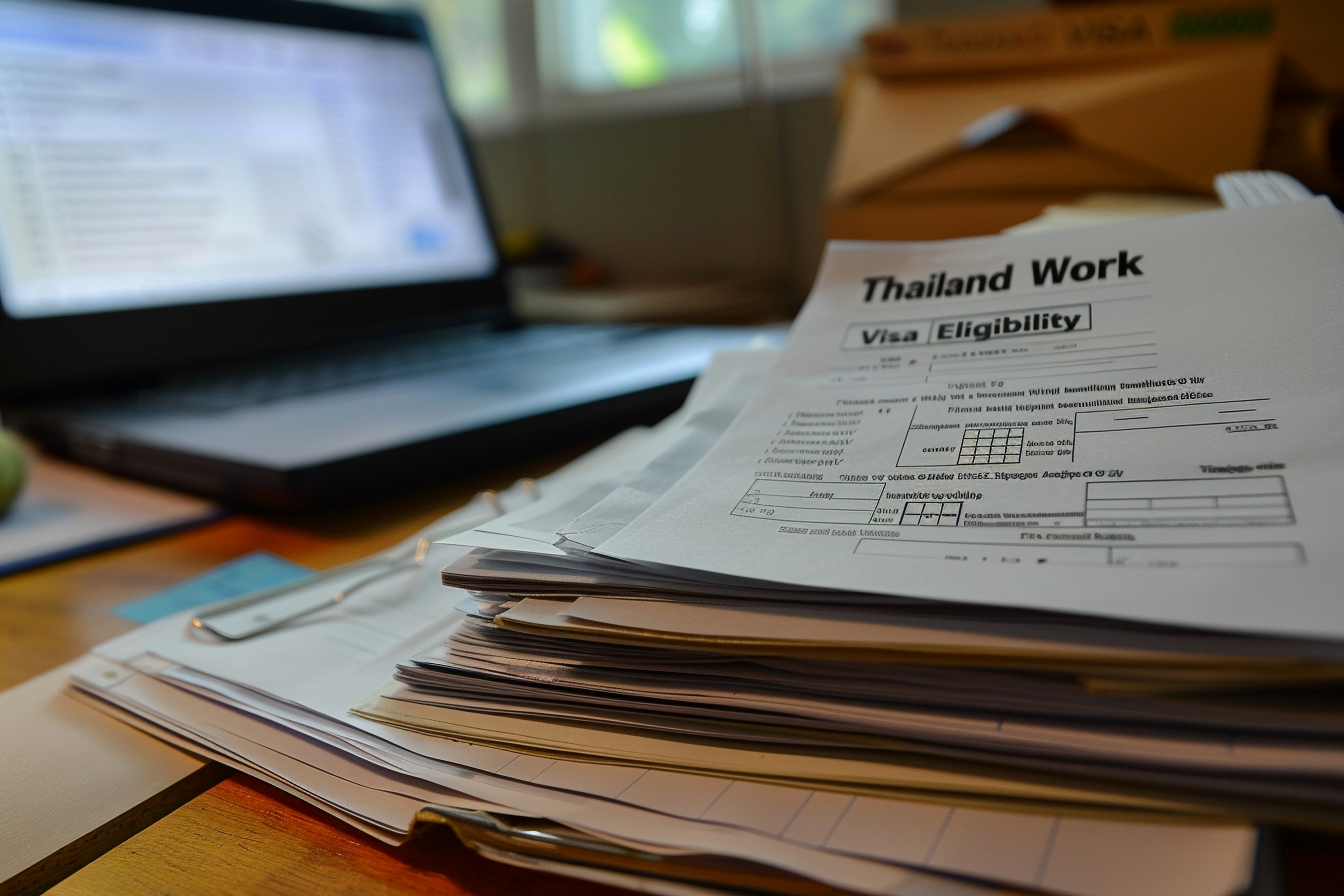Discover the essential thailand work visa eligibility criteria. Find out if you qualify and learn about the application process here.
Did you know that over the last year, Thailand has seen a significant uptick in its expatriate workforce, evidencing the country’s dynamic market and its appeal to international professionals? However, delving into the experience of working in this vibrant culture begins with navigating the thailand work visa eligibility criteria. Securing a work permit is a non-negotiable legal step, and irrespective of your current visa type, working without this permit is considered illegal in Thailand. Before setting foot in the ‘Land of Smiles’ for professional purposes, understanding the work visa requirements Thailand has in place is crucial.
Prospective employees must enter Thailand with the correct type of visa, specifically a non-immigrant visa, and then follow a precise process that involves submitting various personal and employer-provided documents to the Thai Ministry of Labor office. Aligning oneself with the thailand work permit qualifications is essential to undertake this journey smoothly. Those who have traversed this path commend the rich professional growth that follows, provided the thailand employment visa prerequisites are thoroughly met.
Key Takeaways
- Foreigners must have a work permit to legally work in Thailand.
- The initial step requires a non-immigrant visa before applying for a work permit.
- Employment in Thailand without a work permit is considered illegal.
- Work permit applications take about 7 business days to process.
- Understanding the eligibility requirements is pivotal for smooth professional integration in Thailand.
Understanding Thailand Work Visa Fundamentals
Securing employment in Thailand is an opportunity many foreigners pursue, but it involves navigating through the country’s visa and work permit regulations. Understanding how to qualify for a Thailand work visa is crucial in this process, highlighting the importance of the non-immigrant Category ‘B’ visa, tailored specifically for work purposes.
The Critical Role of Non-Immigrant Visas
Non-immigrant visas serve as the foundation for obtaining a work visa in Thailand. The Category ‘B’ visa is the primary pathway for professionals seeking to establish their careers within Thai borders. Still, it’s important to recognize that this visa serves only as a preliminary step toward legal employment, as all foreign workers must also acquire a work permit.
Kinds of Employment Eligible for Foreigners
Thailand offers a variety of employment opportunities to foreigners, but not all fields are open due to legal restrictions protecting certain jobs for Thai nationals. Sectors open to international expertise include education, manufacturing, and IT services. To understand work visa Thailand qualifications, one must be aware of the jobs accessible as per Thai law.
Visa Duration and Renewal Options
Once issued, a Thailand work visa and the accompanying work permit have specific durations, typically aligned with job contracts or projects. Foreign workers have the option to apply for visa renewals, contingent upon meeting the relevant qualifications, such as Thailand work visa qualifications which include employer endorsement and legal compliance such as tax payment and maintaining the mandated ratio of Thai to foreign employees.
| Visa Category | Duration | Eligibility for Renewal |
|---|---|---|
| Non-Immigrant Visa Category ‘B’ | 1 year (commonly) | Yes, with continued employment and legal adherence |
| Marriage Visa | 1 year (commonly) | Yes, subject to marital status verification |
| Education Visa | 90 days to 1 year | Yes, if educational program continues |
Understanding and following the guidelines for Thailand work visa qualifications assure a smooth process in not only acquiring but also maintaining work authorization in Thailand, allowing professionals from around the world to contribute to and benefit from the thriving Thai economy.
Essential Thailand Work Visa Eligibility Criteria
Gearing up to navigate the Thailand work visa application can be daunting, yet it’s essential to understand the **eligibility for a work permit in Thailand**. At its core, the criteria are multi-faceted, designed to ensure that foreigners meet all legal requirements before joining the Thai workforce.

Here’s what you need to know about the **Thailand work visa application criteria**. You must have a non-immigrant visa or a resident visa in your possession. This is the baseline requirement which allows you to then seek out a work permit. A confirmed job offer from a sanctioned employer is non-negotiable, along with all related supportive documents. It is important to remember that there are certain occupations that are prohibited for foreign workers in Thailand, emphasizing the necessity to research thoroughly before proceeding.
Additionally, the **work visa Thailand documents** required include:
- A valid passport and a duly signed visa application form.
- A recent passport-sized photograph that adheres to the official guidelines.
- Proof of adequate financial means to support your stay.
- A police clearance certificate to demonstrate your good standing.
- An endorsement letter from the Thailand Ministry of Labor.
Those in the educational sector should be prepared for additional specific documentation to be presented. Moreover, successful applicants might gain access to public healthcare in Thailand, an important consideration for long-term residents.
Let’s not forget the **Thailand work visa age limit**; applicants should typically be between the ages of 18 and 50. Each case, however, is assessed on an individual basis, and exceptions to this range can be made under specific circumstances.
Armed with this knowledge, prospective applicants can confidently approach the process, understanding the necessary steps towards securing a work permit in Thailand. With every document in place and criteria met, your journey towards working in Thailand can commence with assured legality.
Thailand Work Visa Application Process Explained
Embarking on the journey to acquire a Thailand Work Visa starts well before setting foot in the country, with a series of steps that require careful planning and attention to detail. Ensuring your entry is as smooth as possible involves understanding the intricacies of the Thailand work visa application process, including required documentation, legal necessities, and adherence to specific work visa Thailand restrictions.
Application Steps Before Entering Thailand
Prior to arrival, applicants must secure a visa from a Thai Embassy or Consulate, which is the first pivotal step in the process. This phase involves gathering various documents such as a valid passport, educational certificates, employment offer documents, a comprehensive CV, and a health certificate. These documents form the backbone of your application and are crucial for the next phase of obtaining your work permit.
Acquiring a Thai Work Permit Post Arrival
Once you’ve arrived in Thailand, the next critical step is to apply for a work permit at the Department of Employment. It is essential to have all personal documents from your home country legalized and professionally translated into Thai, as this will significantly contribute to the success of your work visa Thailand application process. Following the work permit application, an extension of stay needs to be processed through the Thai Immigration Bureau to ensure compliance with the Thailand work permit requirements.
The typical work visa Thailand duration ranges depending on individual circumstances, but usually, the initial work permit processing takes about 7 business days, with various fees associated with its issuance and duration. Below is a comprehensive table that breaks down the process timeline and associated fees.
| Process Step | Timeline | Associated Fees |
|---|---|---|
| Application at Thai Embassy/Consulate | Varies by Location | Consulate Fees |
| Work Permit Application | 7 Business Days | Work Permit Fees (Vary) |
| Extension of Stay Application | Varies | Extension Fees |
Keep in mind that while the fees are subject to change and may vary based on the applicant’s nationality and specifics of their visa category, the table provides a guideline for what you might expect. Always check with the Thai Embassy or Consulate for the most up-to-date information regarding your visa application.

It’s essential for potential applicants to navigate the Thailand work visa application process with a thorough understanding of the timelines and costs involved, as well as the work visa Thailand restrictions to ensure a straightforward and successful employment period in Thailand. With this guide, you’re on your way to taking the next steps toward your working journey in the Land of Smiles.
Navigate the Legal Framework: Prohibited Occupations and Compliance
When considering the steps to secure employment in Thailand, it is crucial for expatriates to understand the thailand work permit requirements. A legitimate work permit is indispensable, and not all jobs are accessible to international professionals due to restrictions that preserve certain positions for Thai nationals.
Understanding Jobs Exclusively for Thai Nationals
In the Thai labor market, some sectors are restricted to ensure economic and cultural preservation. These include jobs in agriculture, manual labor, and much of the service and retail sector. Understanding who can apply for thailand work permit involves recognizing these restrictions, thereby aligning career aspirations with feasible opportunities.
Legal Consequences of Violating Work Permit Regulations
Vigilance in adhering to work permit stipulations is paramount. Foreign workers found in breach of thailand work visa qualifications and permit regulations may face severe ramifications, potentially involving fines or imprisonment. Therefore, compliance is not just regulatory but a matter of personal and professional security in Thailand.
| Category | Jobs for Thai Nationals | Permitted Foreign Occupations |
|---|---|---|
| Agriculture | Farming, Fishery | Agricultural Management |
| Services | Salons, Thai Massage | IT Services, Consultation |
| Commercial | Street Vending, Retail | International Trade, Business Development |
Thailand Work Visa Eligibility Criteria Insights
To successfully navigate the Thailand work visa application process, it is vital to understand the specific eligibility criteria and qualifications required for foreign nationals. This understanding ensures that applicants are well-prepared to legally work within the Kingdom.
Below is a summary of the key factors that determine eligibility for obtaining a work visa in Thailand:
- Applicants must hold the appropriate visa type, usually a non-immigrant visa, before applying for a Thai work permit.
- A confirmed job offer from a Thai employer, along with comprehensive documentation, is necessary to proceed with the application.
- Foreigners must align their employment with the list of occupations that are permissible for non-Thai nationals to hold.
Both employers and potential employees share the responsibility of ensuring compliance with all regulations throughout their professional engagement in Thailand.

In addition to meeting the Thailand work visa eligibility criteria, applicants must yield to a thorough document verification process. The following items represent a part of the required documentation:
- Valid passport with remaining validity of not less than 6 months
- Completed visa application form
- Recent passport-sized photo adhering to the specified dimensions
- Financial statement proving adequate funds for the duration of stay
- Police clearance and medical certificates from the applicant’s home country
- Corroborative documents from the employing company in Thailand such as registration papers and financial statements
It is crucial for foreign workers to keep abreast of any changes to the work visa Thailand qualifications which may result from shifts in the labor market or immigration policies. Staying updated with these changes can be the difference between a seamless application experience and possible legal impediments.
Ensuring all aspects of the Thailand work visa application are meticulously completed will lead to a more efficient and stress-free approval process, paving the way for a rewarding professional experience in Thailand.
Conclusion
Securing the right to work in Thailand entails adherence to a set of thailand work visa eligibility criteria that ensure the country’s labor policies and regulations are respected. It all begins with obtaining a non-immigrant visa, but that’s merely the first step. The journey towards a lawful employment experience in Thailand requires a deep understanding of the process, encompassing everything from application to compliance.
The pursuit of obtaining a work visa in Thailand demands careful attention to detail and proactive compliance with the nation’s labor laws. The stakes are high, as the penalties for non-compliance can seriously affect one’s legal standing and employment prospects. Therefore, being diligent during the application process and maintaining good standing with Thai labor regulations is paramount for a rewarding employment experience in this vibrant country.
Embedding oneself in the fabric of Thailand’s professional landscape, therefore, is much more than a bureaucratic hurdle. It is an opportunity to engage with and contribute to the dynamism of Thailand’s economy while experiencing its rich culture and hospitable environment. Achieving this requires rigorous preparation, ensuring that all steps from visa acquisition to work permit attainment are meticulously followed.
FAQ
What are the eligibility criteria for a Thailand work visa?
To be eligible for a Thailand work visa, individuals must possess a non-immigrant visa or resident visa, have an official job offer from an eligible employer, and provide the necessary supporting documentation. Applicants must not be engaged in any occupation prohibited for foreigners.
What is the role of a non-immigrant visa in the Thailand work visa process?
A non-immigrant visa, specifically Category ‘B’, is necessary for foreign nationals seeking to work in Thailand. This visa must be obtained before applying for a work permit and an extension of stay, which are required to legally live and work in the country.
What kinds of employment in Thailand are eligible for foreigners?
Foreigners can work in Thailand in various sectors except for certain occupations that are reserved exclusively for Thai nationals. These restrictions are outlined in categorical lists that define which job types foreigners are prohibited from performing.
What is the duration of a Thailand work visa, and can it be renewed?
Work visas and permits in Thailand are granted for specific durations, based on the employment contract. They can be renewed, subject to fulfillment of legal requirements, such as continued employment, payment of taxes, and in some cases, hiring a certain number of Thai nationals.
What documents are required for a Thailand work visa application?
Required documents typically include a valid passport, signed visa application form, passport-sized photograph, proof of financial means, police clearance, relevant academic certifications, a health certificate, and supporting documents from the prospective employer, such as company registration and tax records. Documents from the applicant’s home country must be legalized and translated into Thai.
What is the age limit for applying for a work visa in Thailand?
There is no strict age limit set for Thailand work visa applicants. However, applicants must be of legal working age according to Thai labor laws and possess the qualifications and experience required for the specific job they are applying for.
How do I apply for a work visa before entering Thailand?
Before entering Thailand, you must apply for a non-immigrant visa at a Thai Embassy or Consulate in your home country. Once granted this visa, you can enter Thailand and proceed to apply for a work permit at the Department of Employment.
How do I acquire a Thai work permit after arriving in Thailand?
Upon arriving in Thailand with the appropriate visa, you can apply for a work permit at the Department of Employment. After obtaining the permit, you will need to apply for an extension of stay at the Thai Immigration Bureau to legally live and work in Thailand.
What jobs are exclusively for Thai nationals, and which can foreigners undertake?
The Thai government has stipulated certain jobs that are reserved for Thai nationals, most notably in fields such as agriculture, forestry, fisheries, accounting services, hairdressing and beauty treatment, and several others. Foreigners can obtain work permits for other jobs not on the prohibited list, provided they meet the necessary qualifications and requirements.
What are the legal consequences of violating Thailand work permit regulations?
Violating work permit regulations in Thailand can result in severe penalties, including fines and potential detention. Additionally, unauthorized employment can lead to deportation and being blacklisted from re-entering Thailand.
How can I ensure compliance with Thailand’s work permit regulations?
To comply with Thailand’s work permit regulations, ensure you have the correct visa type, an official job offer, and all required documentation. Strictly adhere to the designated list of occupations foreigners are allowed to perform, and keep your work permit updated with any changes in your employment status.






Leave a reply